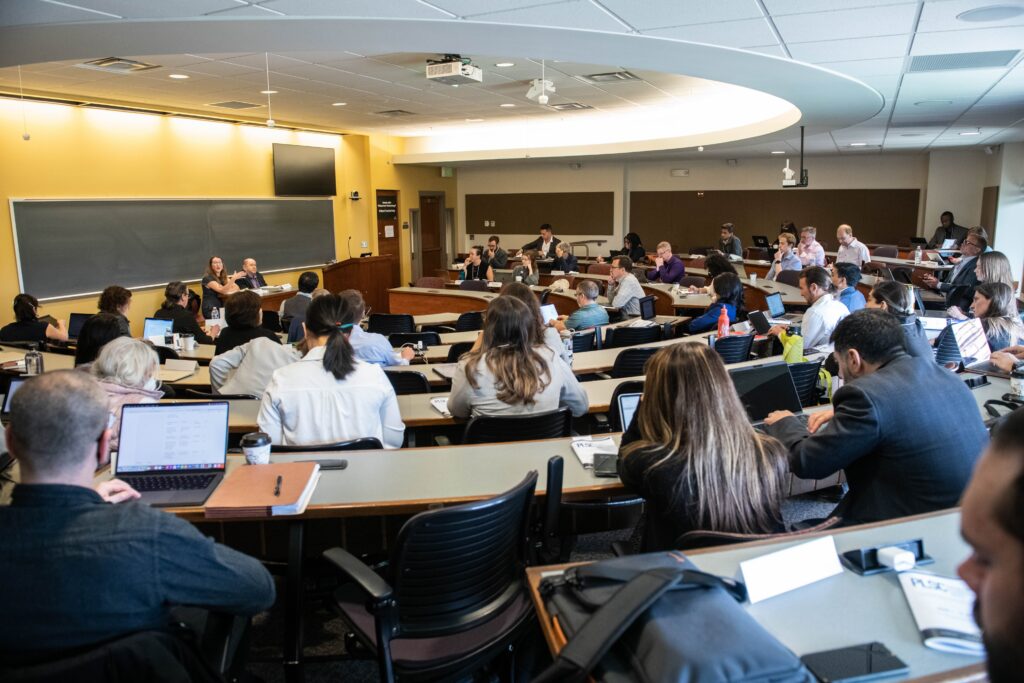Whether you are new to PLSC, taking on a new role (as an author or commentator) for the first time, or looking for samples of accepted abstracts to hone your own submission, read below to find out a little bit more about how PLSC works and our expectations of participants.
PLSC started in 2008 to bring privacy law scholars and practitioners from around the world together to discuss current issues in information privacy law and policy. The conference is, first and foremost, a paper workshop. Authors, commentators, and participants all work together to discuss ideas contained in the drafts. If all goes well, both authors and participants come away from workshops inspired by the discussion and with insights that will help them in their own work. PLSC is conducted under the Chatham House Rule, meaning participants are free to use the information received, but neither the identity nor the affiliation of the speaker(s), nor that of any other participant, may be revealed. Since authors are work-shopping drafts, please do not distribute or cite authors’ PLSC papers without their permission.
Authors
If you are an author at PLSC, most of your hard work is done before you arrive. Authors do not present their papers, nor do they need to prepare any comments in advance. Instead, the role of the author at PLSC is to listen, contextualize, and benefit from the discussion. While authors certainly participate in their own workshop and may respond to comments as they see it, authors are not required or expected to explain every decision they made in the paper. The workshop is ultimately for your benefit, so feel free during the discussion to ask specific questions of the participants in your session.
Commentators
Commentators at PLSC have the important role of leading the discussion at a Paper Session. All Paper Sessions begin with commentators taking approximately 5-10 minutes to summarize the paper (focusing on its major arguments and contributions), reflecting on it, and providing feedback and provocations. Because it is assumed that the workshop participants have already read the paper, the summary acts just as a refresher. In order to set up a productive and lively discussion, commentator feedback is usually focused on substance and the big picture instead of addressing specific nits or citation issues. (Commentators frequently provide authors such smaller and specific kinds of feedback before or after the workshop). After the commentator’s initial remarks, authors sometimes take no more than a few minutes to respond. This is a good time to highlight any particular areas with which authors would like feedback. This is optional. Some authors choose to go straight to the broader discussion to get as much feedback as possible.
At this point, the commentator is in charge of leading discussion by keeping a queue, calling on participants when it is their turn, and cutting people off if they ramble on for too long. The traditional way for participants to indicate that they would like to speak is to turn up their tent card that has their name on it, turning it down once they have been called on. It is customary to let participants who have not spoken yet jump the queue over participants who have already spoken in a workshop. When it is time for the session to end, the commentator wraps up discussion and everyone congratulates the author.
Active Participants
As a participant, you have two responsibilities. First, be sure to read ahead of time the papers of the workshops you want to attend. Second, provide constructive feedback to the author. You will be given a tent card at registration with your name on it. If you’d like to join the queue to speak, simply turn up your tent card and turn it back down once you have been called on.
The best kinds of feedback are those that will be helpful to the author as they revise their draft, invite contemplation, and generate discussion. Feedback can be comments or questions to the author. We ask participants to be mindful of the time, so concise feedback is optimal when there is a queue. Specific nits or feedback over smaller issues like citation or formatting are usually best directly delivered to the author before or after the workshop. We strive to create an inclusive, safe, and positive environment for all participants, so please be mindful of our Code of Conduct as you participate. PLSC is at its best when participants share their wisdom and feel enlightened by the discussion.


